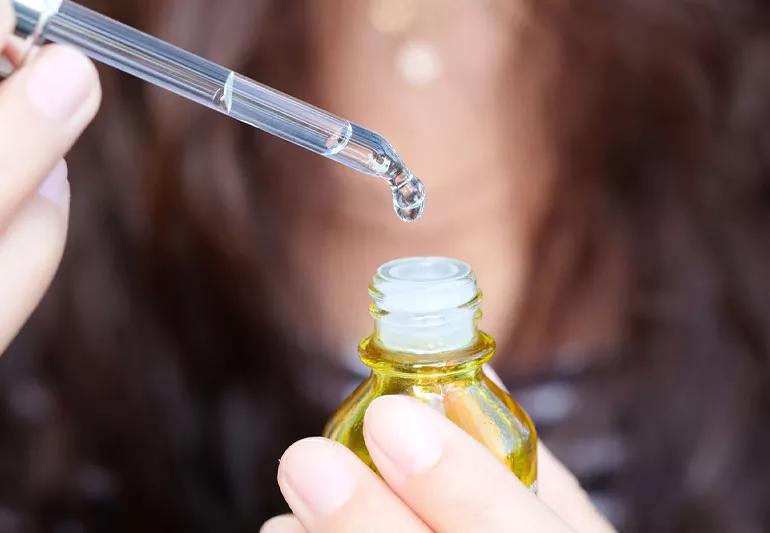This popular ingredient isn’t just for citrus fruits anymore

Vitamin C has long been popular as, well … a vitamin, touted in everything from immune-boosting powders to your morning glass of orange juice. More recently, though, it’s become a buzzworthy skin care ingredient, too. It’s touted for its anti-aging, firming and brightening properties.
Advertisement
Cleveland Clinic is a non-profit academic medical center. Advertising on our site helps support our mission. We do not endorse non-Cleveland Clinic products or services. Policy
So, what can it really do for your skin? Dermatologist Melissa Piliang, MD, weighs in on the benefits of vitamin C serum, when to apply it and how long it’ll take to see results.
Vitamin C is great for your body, but when you consume it (like through food, drinks and supplements), your skin mostly misses out. The best way to reap the dermatological benefits of vitamin C is by applying skin care products that contain it.
These days, vitamin C — also known as ascorbic acid or L-ascorbic acid — often comes in serum form, though it can also be found in creams and lotions, all of which help your skin to easily absorb it.
“It’s a very good ingredient to include in your skin regimen,” Dr. Piliang confirms. She walks you through the benefits of using vitamin C serum.
Our skin is under constant assault from outside enemies from sun exposure and contaminated air, along with standard aging. These things can all rob our skin of its luster by creating free radicals, unstable molecules that steal electrons from your cells and cause damage.
Common sources of free radicals include:
Advertisement
But antioxidants can protect your skin from free radicals by lending them electrons to bind to instead. “There’s good scientific evidence to show that vitamin C has antioxidant effects,” Dr. Piliang says. “Using topical vitamin C can result in less cell damage and better-looking skin.”
Free radicals can accelerate your skin’s aging, so on that front, vitamin C is already fighting the good fight. It’s also been shown to protect and increase your skin’s production of collagen, a protein that holds your body’s tissues together.
“As you age, your skin produces less collagen,” Dr. Piliang explains. This leads to wrinkles, sags and bags, so protecting and replacing collagen can protect your skin from signs of aging.
When you’re trying to protect your skin from the sun, you want all the protection you can get — and vitamin C gives you a little bit extra.
“Studies show that when you combine vitamin C with sunscreen, you get even better sun protection and sun aging protection because they work together,” Dr. Piliang notes. “If any of the sun gets through that sunscreen, the vitamin C is there to take care of it.”
And move over, aloe. Using vitamin C with vitamin E and a few other topicals can reduce the pain and inflammation caused by sunburns.
Vitamin C has a reputation for helping even out skin tone by fading sun spots and other dark spots on the skin.
In one study, 73% of participants saw an improvement in their hyperpigmentation while using topical vitamin C, though the effects seem to be temporary. Once you stop applying the ingredient, the effects will start to fade.
Say goodbye to those “You look tired” comments! A 14-person study showed that vitamin C helped improve dark under-eye circles caused by pooled blood. The study also showed that vitamin C’s collagen-boosting ability may help thicken the skin under your eye, making it harder to see the pooled blood (dark circles).
Most people don’t experience any negative side effects from using vitamin C serum, but in rare case, you may have:
If you have sensitive skin, start with a low concentration of L-ascorbic acid, just to be on the safe side.
There are plenty of vitamin C products on the market at a variety of price points. Here are some things to look for:
Advertisement
Apply vitamin C serum after cleansing (and after applying your toner, if you use one). And although it’s safe to use overnight, Dr. Piliang recommends applying it in the morning because of the way it serves as a backup to sunscreen. “They work in synergy.”
And although you can use vitamin C on your skin every day, don’t expect to see results right away.
“It takes about three months to really see the effects, so be patient,” Dr. Piliang advises. “I suggest taking a picture of yourself with no makeup or anything on your face, and then photograph yourself once a month to see the effects.”
To learn from Dr. Piliang on related topics, listen to the Health Essentials Podcast episode, “Skin Care Tips, Tricks and Trends.” New episodes of the Health Essentials Podcast publish every Wednesday.
Advertisement
Learn more about our editorial process.
Advertisement

This powerful antioxidant does more than fight colds — it keeps you healthy inside and out

Move over, oranges! You can also get vitamin C from strawberries, kiwi and green veggies

Research consistently shows that soy-based foods do not increase your risk of breast cancer

Properly prepared, elderberries can be a safe and healthy part of a balanced diet — just steer clear of supplements

It’s a great disinfectant for around your home, but not for your skin

Changes in texture, smell, color and performance are signs it’s time to throw the cosmetic item away

Follow the 4Cs — cooling, cleaning, covering and comforting — to start the healing process

Making lifestyle changes can help reduce your blood pressure, but taking cinnamon supplements probably isn’t one of them

Wearing a scarf, adjusting your outdoor activities and following your asthma treatment plan can help limit breathing problems

Your diet in the weeks, days and hours ahead of your race can power you to the finish line

When someone guilt trips you, they’re using emotionally manipulative behavior to try to get you to act a certain way